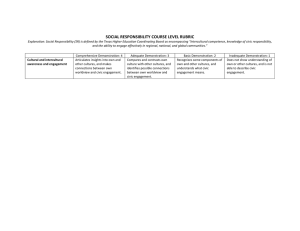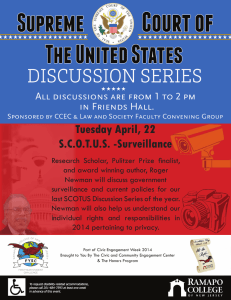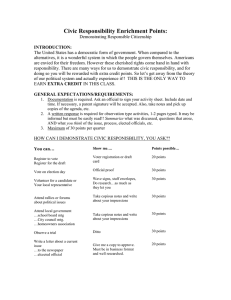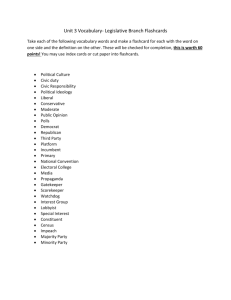Closing the empowerment gap through citizenship education
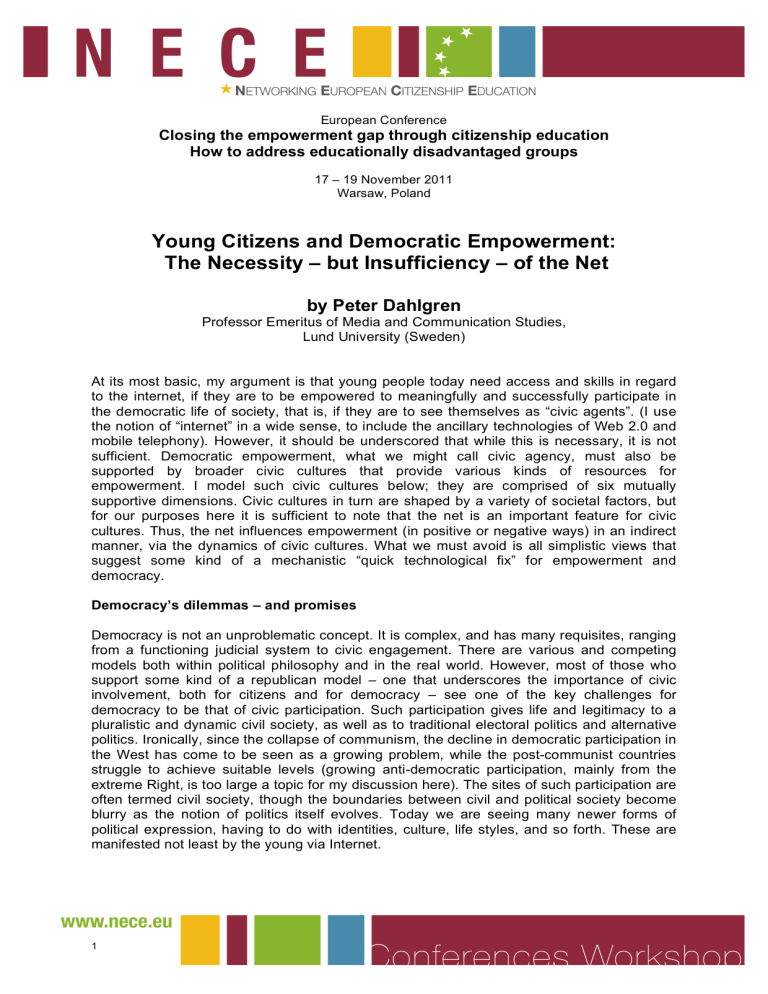
European Conference
Closing the empowerment gap through citizenship education
How to address educationally disadvantaged groups
17 – 19 November 2011
Warsaw, Poland
Young Citizens and Democratic Empowerment:
The Necessity – but Insufficiency – of the Net by Peter Dahlgren
Professor Emeritus of Media and Communication Studies,
Lund University (Sweden)
At its most basic, my argument is that young people today need access and skills in regard to the internet, if they are to be empowered to meaningfully and successfully participate in the democratic life of society, that is, if they are to see themselves as “civic agents”. (I use the notion of “internet” in a wide sense, to include the ancillary technologies of Web 2.0 and mobile telephony). However, it should be underscored that while this is necessary, it is not sufficient. Democratic empowerment, what we might call civic agency, must also be supported by broader civic cultures that provide various kinds of resources for empowerment. I model such civic cultures below; they are comprised of six mutually supportive dimensions. Civic cultures in turn are shaped by a variety of societal factors, but for our purposes here it is sufficient to note that the net is an important feature for civic cultures. Thus, the net influences empowerment (in positive or negative ways) in an indirect manner, via the dynamics of civic cultures. What we must avoid is all simplistic views that suggest some kind of a mechanistic “quick technological fix” for empowerment and democracy.
Democracy’s dilemmas – and promises
Democracy is not an unproblematic concept. It is complex, and has many requisites, ranging from a functioning judicial system to civic engagement. There are various and competing models both within political philosophy and in the real world. However, most of those who support some kind of a republican model – one that underscores the importance of civic involvement, both for citizens and for democracy – see one of the key challenges for democracy to be that of civic participation. Such participation gives life and legitimacy to a pluralistic and dynamic civil society, as well as to traditional electoral politics and alternative politics. Ironically, since the collapse of communism, the decline in democratic participation in the West has come to be seen as a growing problem, while the post-communist countries struggle to achieve suitable levels (growing anti-democratic participation, mainly from the extreme Right, is too large a topic for my discussion here). The sites of such participation are often termed civil society, though the boundaries between civil and political society become blurry as the notion of politics itself evolves. Today we are seeing many newer forms of political expression, having to do with identities, culture, life styles, and so forth. These are manifested not least by the young via Internet.
1
If we thus take the view that for young people as well as for democracy generally, their participation is not only desirable but necessary, the next question becomes: what kinds of factors can promote – or hinder – such participation? Phrased differently, we could ask: what kind of things will facilitate empowerment, making people (of whatever age) see themselves as civic agents and render their participation meaningful for them?
Towards empowerment: civic cultures
Democratic empowerment, the sense of civic agency, cannot arise in a vacuum; it must be supported by and integrated within a larger cultural milieu that has relevance for participation.
Civic cultures is a framework intended to help illuminate the conditions that are necessary for participation, that people can draw upon to nourish their identity – and their empowerment– as citizens (I offer a more extensive treatment of this theme in Dahlgren, 2009). There are in fact, as we shall see shortly, rather commonsensical. In a nutshell, assuming the society in question is not completely authoritarian and that there are at least some objective possibilities open for societal involvement, civic cultures comprise those cultural resources that citizens’ can draw upon for participation.
To the extent that they are compelling, they operate at the level of citizens’ taken for granted horizons in everyday reality. I use the plural form to indicate that in the late modern world there are many ways in which participation can be accomplished and enacted; there is no one universal civic culture, but all versions promote something we would call democracy. For young people, civic cultures may well have different profiles than for older age groups, and for different groups among the young (e.g., based on gender, ethnicity, class, geography, and so on), civic cultures may also vary.
Civic cultures do not simply pre-exist in nature, but are historically shaped by an array of factors. Certainly family and schools lay a foundation (even if the way social relations and the exercise of authority in both family and schools at time can convey anti-democratic messages). More broadly we can say that the basic parameters of civic cultures are derived from structural features of society – relations of power, economics, the legal system, organisational possibilities – all can have their impact. However, for our purposes here, the centrality of the media comes into view, both the traditional mass media and the newer digital media (though the distinction is diminishing). Their form, content, specific logics, and modes of use become the most accessible tools of civic cultures. Empowerment and participation have a great deal to do with communication, with being meaningfully connected; civil society and public spheres today are dependent on the internet, at the local, regional, national, and global levels. This is all the more true of young people, a point I will return to below.
Robust civic cultures are necessary prerequisites for the vitality of public spheres – and thus for the functioning democracy as a system, but also for the empowerment of citizens at the individual level. The perspective of civic cultures is interested in the processes of how people develop into citizens, how they come to see themselves as members and potential participants in societal development, and how such empowered senses of self are maintained. I conceptualise civic cultures as consisting of six interdependent dimension: knowledge, values, trust, spaces, practices/skills, and, finally, identities
2
Six dimensions
Knowledge: That knowledge is an important dimension for civic cultures is quite obvious; we should also keep in mind, however, how the new media give rise to new forms of knowledge, as well as how it is stored, retrieved, and produced. This is leading to new ways of thinking, to new cognitive architectures. Indeed, it could be argued that young people are getting two very different forms of education: one in the school, the other on Internet, where they are largely self-taught. Being “bi-cognitive” can be a genuine asset, but we are also aware of the pedagogical tensions between the two, where, for example, young people at times may find school-based knowledge irrelevant or uninspiring compared to their online experiences.
Empowerment requires a fruitful interface of the two.
Values: these are shaped, reinforced or challenged via communication. Democratic values of tolerance, reciprocity, equality, and so on circulate often at the taken for granted level; these are essential if democracy is not to become an empty, formalistic shell. In the lives of young people, evidence suggests the values deriving from the commercial market (i.e. consumerism) often stands in (strong) competition with civic values.
Trust: this is often formulated in terms of people’s (vertical) trust towards institutions, but here
I would also add (horizontal) citizens trust towards each other: is one willing to cooperate for social or political goals with people one does not know personally? The role of networking, and it “loose bonds” becomes central here – and social media in particular take on significance in establishing trust between people.
Spaces: where do young people meet? Where does democracy “take place”? In physical places, such as cafés and lunchrooms, but increasingly also in cyberspace, where “space” is almost unlimited. Participation in the social world, in politics, has a social component, and this, whatever one might think of it, is increasingly screen-based.
Practices: To participate, and especially to mobilise, takes the form of practices, and the skills to enact them. Voting is a classic civic practice, but there are so many more forms of practice: organising, generating enthusiasm, calling and running meetings, debating, and so on. And with Web 2.0, all the possible modes of expression, in multi-media forms, become relevant. The online world becomes interwoven with IRL (in real life).
Identity: all the dimensions impact on each other, but perhaps the most important consequence is precisely in regard to civic identity, the capacity to see oneself as a participant in the social and political world. This aims at the foundation of empowerment. To feel empowered as a civic agent permits one to draw upon and generate new knowledge and experience; this can strengthen values and trust; which can lead to the use of ever more cyberspace, where new skills are developed – and so forth. Research has emphasized
‘identity work’ among the young, in the turbulent path towards adulthood. While civic identities have an individual component as a part of each person’s subjectivity, they also involve some sense collective element, i.e. seeing the self as part of a political community, with affinity towards other, like-minded people. The emergence of sets of ‘we-they’ polarities in politics, with the corresponding degrees of trust and suspicion, is an important manifestation of civic identities. And social media have become enormously important in developing a sense of community, ‘loose bonds’, with extended networks. All his has become very important for empowerment.
3
The web environment
At a general level, Internet and its ancillary technologies have come to constitute an ever more ubiquitous web environment, where more and more of the young people spend much of their time for an array of purposes. Increasingly, young people in particular are using the various affordances of the net not just to send written and spoken words, but also to upload, remix, link and share materials, in increasingly complex and developed ways (Olsson and
Dahlgren, 2010). The net has become not just something they ‘visit’ on occasion in order to seek something special, but more and more a central terrain of their daily lives. From social interaction with friends to gossip blogging, from music perusals to news, from shopping to finding a partner, the web environment is becoming the taken-for-granted site where the lives of young people live are increasingly embedded (Livingstone 2009). The emerging online world is aptly described as “personal, skeptical, ironic, perishable, idiosyncratic, collaborative, and almost inconceivably diversified” (Lievrouw, 2011, p. 214).
We must understand that if it is in this milieu that empowerment is to develop, it will take many heterogeneous forms, some hopefully having to do with democracy, but others certainly of course relevant to other social domains, such as group networking for leisure time pursuits, dating, and consumption.
While civic or political participation is problematically among the general population, it is especially low among younger people. Despite their higher facility in using the Internet, this pattern holds true even in the online setting; civic engagement via the net comes very far down on the list activities within the web environment. This is really not surprising; despite the frequent rhetoric about the young not taking their responsibilities and “abandoning the democratic system”, it could also be argued that the system in many ways abandons or at least marginalizes the young. Research efforts underscore in regard to the net and politics the increasing distance that many young citizen feel towards the established political system and that many of them have a fundamentally different view as to what constitutes the political.
Among the young, there is a sense that a constricted conception of politics still prevails, one that ignores the concerns that they have in their daily lives, such as ethics, identity, justice, taboos, and social power relations. The problem in part has to do with the establishment’s political agenda: politicians seem unable to take up many issues that engage the young, while the issues they do offer do not resonate deeply with younger audiences. It is partly a problem of communication, of modes of representation and expression, but also partly a question of insufficient emotional valence to trigger engagement and participation.
Yet, there is still considerable civic and political activity on the net among young people, and many are indeed feeling empowered through their use of these technologies, as we see manifested in the vast array of movements and networks at the local, national, regional and global levels, usually in extra-parliamentarian contexts. The appeals of 19 th century ideological “isms” is limited, as is mainstream party politics, but participation is often focused on specific, single issues that seem personally meaningful. In regard to the web environment, and media culture generally, we should be aware of the relevance of popular culture and the somewhat porous boundaries it shares with politics. The vast terrain of popular culture (and consumption), despite for its trivia, also offers images and symbols that express and evoke emotion, which are used not least in shaping individual and collective identities; our sense of who we are; moral judgments on what is right, important, and so on.
4
These processes cannot be hermetically sealed off from the political realm and its mainstream versions. With the suitable net skills, young people can easily feel empowered in these domains where “politics” is taking on new meanings. Such developments per se will not “save” democracy at large, but it is important to understand how the civic and political realm are evolving, especially for the young, and how new net-based forms of empowered civic agency are becoming significant.
5


